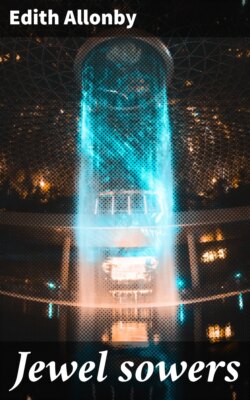Читать книгу Jewel sowers - Edith Allonby - Страница 3
На сайте Литреса книга снята с продажи.
CHAPTER I
AN INTRODUCTION TO LUCIFRAM
ОглавлениеTable of Contents
In the little planet Lucifram, that spun a brilliant and solitary course among the stars, exchanging annual salutations with them as the waxing and waning of the solar laws brought them out of the void and within hail, the people each and all walked upside down. The trees were upside down, the houses, the churches with their steeples, the palaces, the oceans, rivers, lakes, mountains, animals, and fishes, each and all, reversed our own conception of mundane propriety. Cultivate a patience with the seeming strangeness of this extraordinary planet, even to the reading of this simple book, and let that virtue lead you nearer to another sphere, more to your liking.
There were a few, indeed, upon this sphere who did their best to stand upon their feet. Sometimes they succeeded; but others were bowled down in the struggle and ended by standing once again upon their heads, or lying crushed, paying the debt they owed to Outraged Custom.
The circumference of this sphere was something like two thousand miles. It bulged out towards the north and south, with giant hollows to the east and west. And because everything that existed was contrary to our idea of things, all things looked normal.
When Nature and architecture combine to alter things, making them contrariwise, as people call it, what wonder if morality and all ethics blend with the custom?
To begin with governments and kingships. Unlike those upon a two-legged basis, a king was never chosen for his worth, but for his frailties. He was chosen to strew the path of his subjects with flowers which all might pick like little children out at play, and then would quarrel over.
Alas! To be a king in the planet Lucifram! That little planet topsy-turvy. Here, though a ruler might have the will of a Hercules to turn a somersalt and land upon his feet, some diviner instinct calling him to that, the pigmies around him pinned him with millions of tiny threads, an anchorage whereby to hold his head safe to the ground. Threads worked in gold! Held for the wonder of the multitude.
So for the kings. The Gods of all the stars looked down on them. They heard those faint sighs of weakness—those breathings after higher things—and pitied some, and smiled at others. And though in the topsy-turvy synagogues and churches the people prayed for them, no prayers reached heaven except those simple few the kings themselves breathed in solitude. Prayers that must travel very, very far, as all prayers must, and which needed the giant strength of great simplicity to bring them to the end of their weary journey.
So for the kings and princes. An arduous task is theirs—bound thus with chains—God only knows how hard! As each insidious little link might whisper, telling its own small share in the universal tale.
In our world we always speak of “Church and State”—a correct and steady way of speaking—but in Lucifram ’tis always “State and Church,” and that is why the palaces and kings claimed our attention first.
The Church, composed of temples, synagogues, and priests, jumbled together in luxurious profusion, was dressed and bedecked so finely that the God the people worshipped fell almost out of sight. In their chief temple, in the greatest city, was a three-tailed golden Serpent, coiled around a golden pole above a table decked in red, and set with incense vessels. Dim and mysterious was that holy place, where priests, all flowing and bedecked in golden garments, came each day to bow before the Snake. Its three tails, the gold of them burnished like fire, spread out like fans on high, against a background of mosaic. Below, resting on the altar, was the great head, lying quite still; the genius of ages worked in its cruel fangs and awful eyes. Eyes never closing, jewel-glinting, green and fiery, all-surveying, all-watching. Those terrible eyes lit up the gloom, and compelled men to stand upon their heads as it itself was forced to do. For by the grim and dreadful fascination of those never-closing eyes, unconsciously the worshippers changed to position like to it, tails up, heads down, blinded by their religion.
In this temple the people sat in the big gloomy aisles, each on a little chair with a ledge in front for kneeling, and heard the priest from the pulpit, and the reader from his desk. Awed by the grandeur and the solemn dimness, they bowed and salaamed before the triune tails, hidden from the vulgar gaze by a red silk curtain blazoned in gold. And when the mighty organ rolled and rumbled, and the angel voices of the choir boys rang through the gold-washed rafters, their senses were stirred by some far hidden mystery, and their eyes would dim or kindle as they felt it; only the gleaming eyes within the veil remained unchanged.
Now it was customary for the priests who waited on the Serpent to fast a day each month and marry only once. A layman in Lucifram might wed twice. No priests could marry under forty. For laymen, the age was twenty-five for the first attempt, and forty for the second; that is, for the few who preferred company in their latter years to peace. But though the women, by Act of Parliament, enjoyed the privilege of marrying twice, just as the men did, there were certain things clearly beyond them, they being in Lucifram, as here, the weaker vessels. On those great days whereon the priest drew back the silken curtain and displayed the Serpent, all women were debarred from entering the temple.
And so enough for an explanation and a prologue. Take my hand, descend, and tread on Lucifram!
